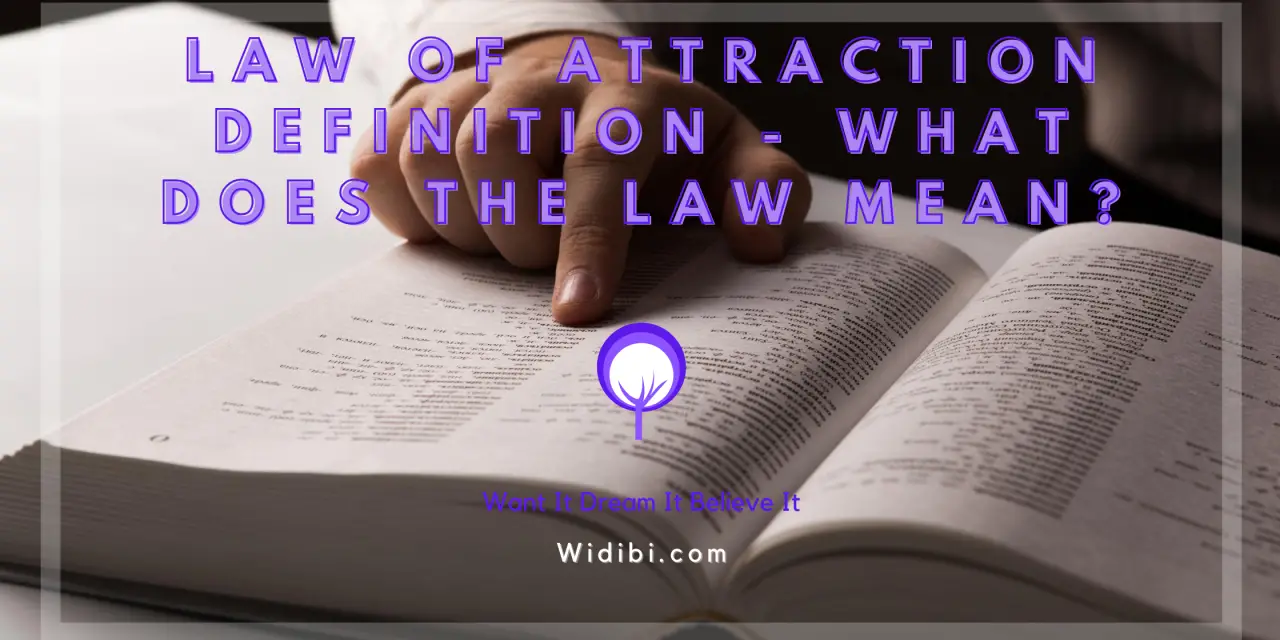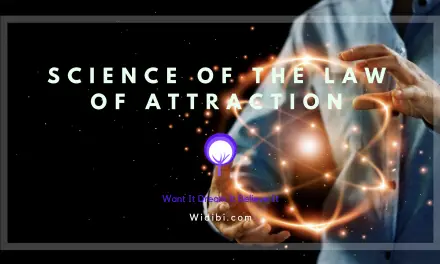Many people that have never experienced the law of attraction for themselves often start out by seeking a law of attraction definition – they want to know what it really means?
When I put together articles that go on to be published here at Widibi, I like to focus on the how rather than the why. I’ve been using the principles and ideologies for a while now. With that said, even I sometimes stop to think about what the law of attraction means. Does it even have a definition?
Well, it does according to Wikipedia, which defines it simply as “the belief that positive or negative thoughts bring positive or negative experiences into a person’s life.”
While simplified, that part of a sentence does an adequate job of describing precisely what the law of attraction is all about. In basic terms, you could indeed define the law of attraction as ‘think good thoughts, reap good rewards’. However, I’d like to delve a little deeper into the concept.
In This Article
The Sceptic’s Law of Attraction Definition
I’m not a sceptic. I believe in the law of attraction because it works for me. As I have mentioned elsewhere, however, I have no issues with people having concerns about the law’s validity.
The main reason for this is that, while unfair, some people ask the question and then place the burden of proof on the answerer.
“Does the law of attraction work?”
“Yes.”
“Prove it!”
“…”
I don’t have any evidence beyond the anecdotal to ‘prove’ that the law of attraction works. However, I can appreciate the psychological aspects of relevant ideas.
So, for me, the Sceptic’s Law of Attraction Definition would be along the lines of ‘a belief system with no real basis in science that encourages people to think good thoughts and reap the rewards – allegedly’.
I’m honestly not here to convince anyone that the law of attraction works. My articles are often targeted at those that already use the law however they see fit. I like to promote discussion and new thought in an area that has existed, in some capacity, for centuries.
My Law of Attraction Definition
My definition of the law of attraction focuses neither on science nor spiritualism. It has more to do with mindset.
For me, the core components of the law of attraction are:
- Positivity
- Gratitude
- Growth and Improvement
I don’t need any kind of magic to understand why practising these as much as possible will yield benefits.
Positivity
If someone asks you to do something and you refuse, they might never ask again. You don’t have to agree to everything – I also believe there’s an element of selfishness to the law of attraction – but I tend to tackle requests like this by thinking about reasons why I can help, rather than reasons why I can’t.
By being a ‘glass half full’ kind of person, you look for the best in everything, from people to opportunities. This isn’t me suggesting you should be naieve, and everything should be assessed on its own merits. However, if you approach everything with positivity and an open mind, you stand a better chance of spotting the opportunities and benefits that others might miss.
Gratitude
Conventional wisdom in the law of attraction dictates that if you demonstrate gratitude for whatever you have, even if that demonstration is to nobody in particular, the universe will work harder to make it even more abundant.
That’s good enough for me. If it isn’t for you, consider how you come across when you demonstrate gratitude. If you make a point of thanking someone when they do something for you, they’re far more likely to do it again in the future. If you thank someone for even the smallest favour, such as the individual that serves you in a shop, you might make their day, make them more positive and get them to do something positive today.
Many believe that there is no such thing as a completely selfless act. If that’s the case, that’s fine too. It doesn’t need to be selfless – if you’re forthcoming with gratitude, people will be the same around you.
Growth and Improvement
I spoke recently on the idea of making a concerted effort to end each day better than when you started. This doesn’t have to be anything major by conventional standards. You don’t need a promotion, new car or holiday each day to consider it a success.
Even if it’s only something as simple as having gone up in someone’s estimations through being positive and grateful, you are, in the eyes of someone, better than you were before.
Law of Attraction Definition – In Summary
I speak so often on the fact that the law of attraction is personal, that I cannot escape that fact here either. If you’re brand new to the concept, the definition taken from Wikipedia at the beginning of this article will be perfectly sufficient for your needs.
However, you should understand that the definition will change as you tailor the law to your needs. You might end up defining the law of attraction as something that gives you confidence in times of uncertainty. You might frame it as the law that ensures you live an abundant life as long as you demonstrate positivity and gratitude.
The day may come when someone can truly define the law of attraction and make it official with proof. Until then, the concept is malleable and I always encourage people to define it however they want, just as long as their chosen result works for them.










